The romanticised image of Ireland as an idyllic home for horses belies a disconcerting reality that not every horse is living a life of luxury; in fact, quite the opposite. However, a band of rescuers are working to help horses in need – and educate on the issue of equine welfare along the way.
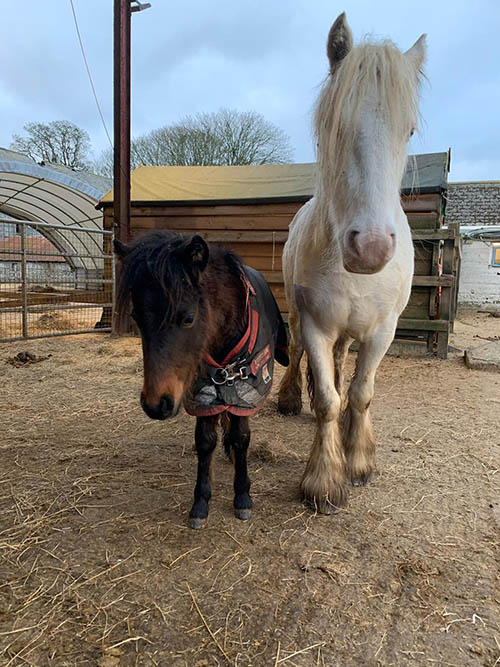
“Ireland is a country of
contradictions.”
“Ireland is a country of contradictions when it comes to our equines and how we look after them,” says Dorothy Collin, one of the dedicated volunteers behind a growing force in equine welfare in Ireland. “Horses have long been a symbol of our heritage and our equestrian prowess, but for many years now horses and all other equines have also been suffering the length and breadth of the country, in both urban and rural settings.”
Dorothy volunteers for My Lovely Horse Rescue (MLHR), a charity founded by sisters Martina and Deborah Kenny and their good friend Cathy in response to the horrific plight of urban horses in Ireland. “Martina, Deborah and Cathy grew up in Dublin and were confronted by countless cases of equine neglect,” explains Dorothy. “The cities of Ireland have hundreds of horses roaming throughout, being indiscriminately bred from and living lives of neglect, abuse and lacking in any sort of proper veterinary and farrier care. There is an endless oversupply and as a result many hundreds if not thousands are being dumped, badly cared for and exploited.”
The trio rescued their first horse in 2011 and since then thousands of animals have passed through MLHR on their way to better lives. The organisation now has three rescue centres, two in County Kildare and one in County Cork, and helps not only equines but other animals too, such as goats and pigs.
MLHR has rescued foals as young as a few days old through to horses over 30 years of age, thrown away after a lifetime of service. “Horses wander our city streets, housing estates, canals and parks, left to graze by owners who have no land of their own and who ignore serious welfare issues; they are simply unwilling or unable to spend the necessary money to properly care for them,” explains Dorothy.
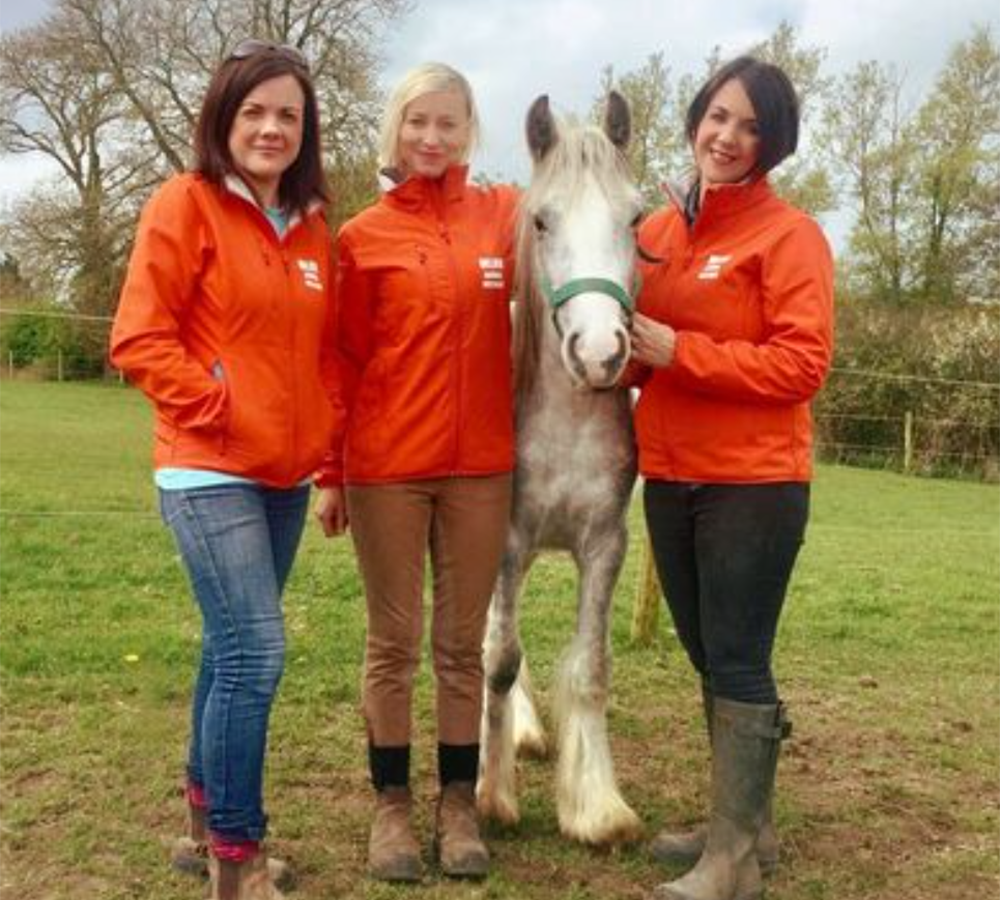
The cycle of using, abusing and discarding horses happens across Ireland and it’s not uncommon for them to be dumped in forests and bogs; sadly, by the time some are found it’s too late. Dorothy says that the situation is starting to look up, however there is still much work to be done. “In 2013 the Irish government brought in the Animal Health & Welfare Act, empowering local government authorities, our police force (An Garda Siochana) and all those designated as authorised officers to act on behalf of animals and their welfare. While this has of course improved the situation, we have a long way to go. There is a huge problem with lack of enforcement in many areas and there is still so much suffering going on out there. We need to get to a point of zero tolerance for equine neglect and abuse, surely something that a country with our equine heritage should see as essential.”
While MLHR hasn’t seen the problem specifically exacerbated by the pandemic as yet, in 2020 they rescued nearly 400 horses – their most in a year to date, and the team is worried that the economic fallout from Covid could create more casualties.
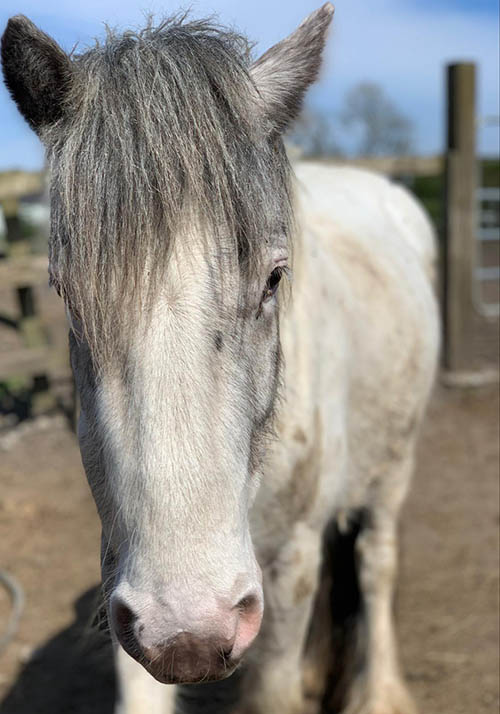
“Slowly but surely
the message is spreading.”
EDUCATION IS KEY
MLHR believes education is “inextricably bound” to improving equine welfare outcomes. “The only way that we can move forward from our current situation is to teach all owners to look after their equines in a way that benefits the equines and then in turn the owners themselves. Too many owners see this relationship purely from the aspect of master and servant. They fail to grasp the wider picture and never develop loving, respectful, symbiotic relationships. They lose out on so much because of this,” says Dorothy.
“We have brought groups of city kids on organised day trips to the farm to show them equines being handled in a very different way than they might be used to seeing. We bring our farrier, equine dentist and a respected carriage horse owner to give them demonstrations on proper equine care.” Covid has not stifled MLHR’s attempts to educate, with Zoom classes run for school students.
MLHR is also educating the police force on their powers, producing an hour-long presentation on interpreting the 2013 legislation, explaining what powers police officers have and giving them the necessary equine knowledge to enforce seizures. “We now work very closely with many police officers when seizing equines and they have been instrumental in helping us to save countless lives. Slowly but surely the message is spreading and the officers themselves are now educating each other on their powers and responsibilities.”
This year, MLHR hopes to establish its first horse project to help educate urban horse owners, many of whom they already work with on a personal level. “The program will educate about ways to care and manage their horses so that they have fewer health issues, there is less need for the use of whipping – which we are opposed to – and they have a more specific breeding plan other than the present one, which is very indiscriminate and unmanaged.”
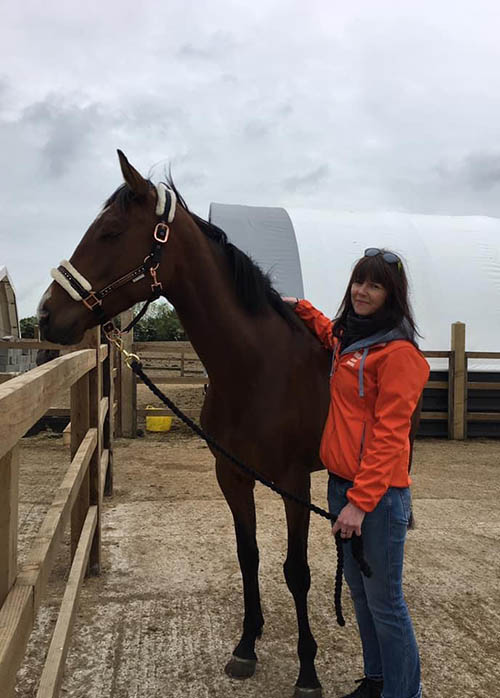
“Our time spent with equines
is beyond precious to us.”
MUTUALLY BENEFICIAL
Dorothy explains that there’s a mutually beneficial relationship between the charity’s volunteers and the animals they rescue. “It’s well known that equines have a very beneficial effect on humans, both physically and emotionally. Being with them can help lower your blood pressure, calm and destress you, and equine therapy is used for a wide variety of conditions including addiction and mental illness.
“For those of us involved with MLHR we would all say, quite honestly, that our time spent with equines is beyond precious to us. None of us went into rescue to be saved by equines, but we all have been. At the start most of us were simply drawn to them because they were in need and we never analysed our relationship with them. But it is so clear now that the gentleness of these powerful animals, their stoic ability to take pain with grace and dignity, the beauty of their relationships with other members of the herd, their ability to fall in love with each other and with us, these things that we are a part of are so precious to our very existence now and inspire us in our daily lives.
“The equines we have met have shown us how to be courageous because they have been brave in the face of such cruelty and aggression. They have taught us to take risks when lives are in danger and need saving. They have taught us that life is truly for living and that we are never more alive than when we are in the service of others. Being part of our equines’ lives is a privilege and we are forever humbled by their allowing us into their world. Being part of that world can heal so much of the pain we humans carry inside of us.”
Dorothy says that for many involved with MLHR, their relationship with animals has changed as a result. “We have gone from being animal lovers to being animal defenders. We understand that loving them is not enough. We must be their protectors and their champions and their human voice. Once you rescue your first equine your whole life changes for the better and will never be the same again.”
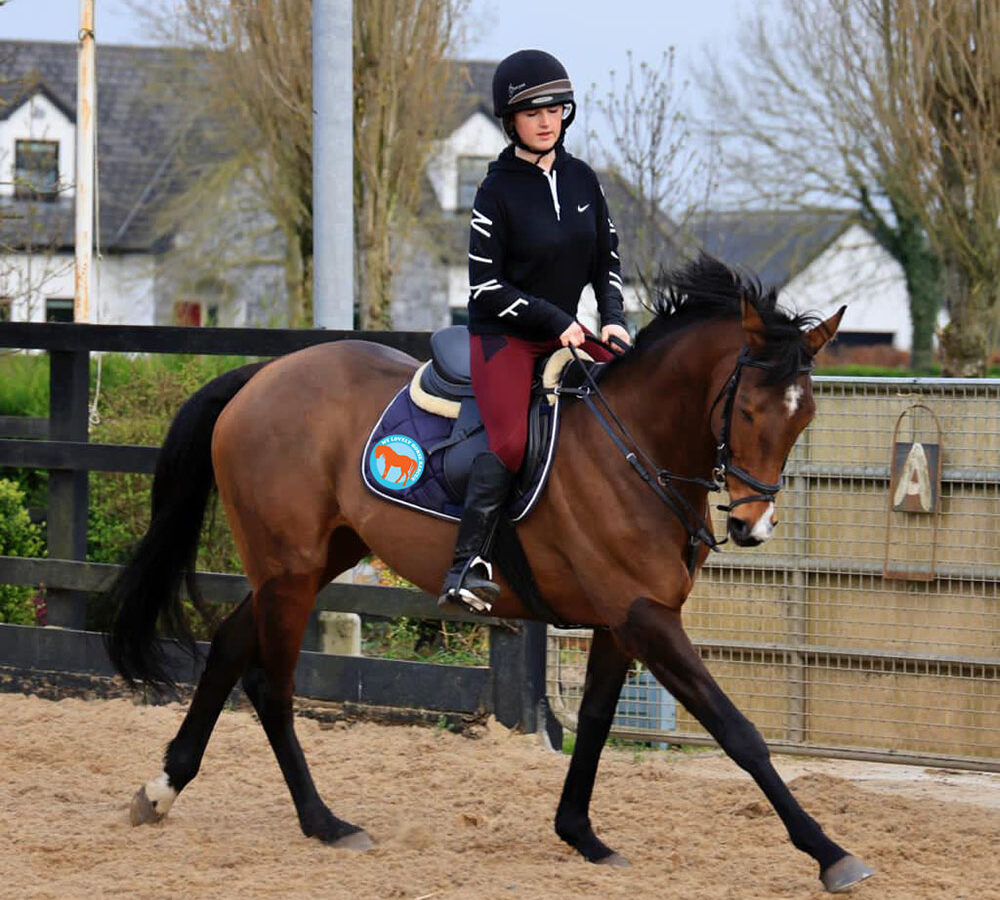
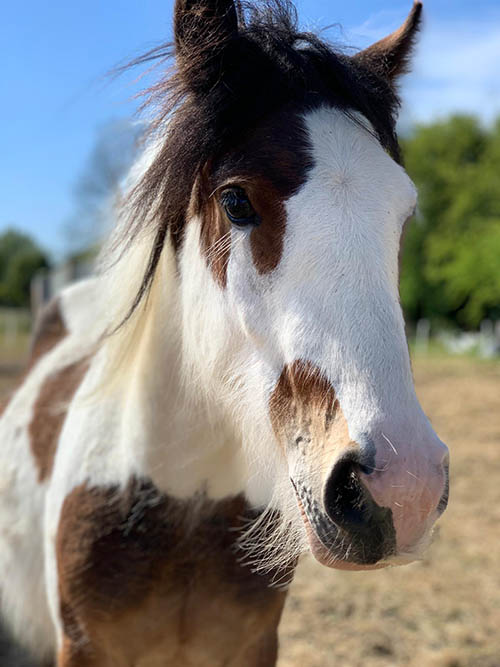
DESCENDED FROM GREATNESS, LEFT TO DIE
Dorothy tells the story of War Celeste, a Thoroughbred mare by War Front – one of the most expensive sires in North America today – and granddaughter of Danzig, sire of sires and the son himself of the great Northern Dancer.
“War Celeste was born in 2012 and sold a year later for £240,000 (about $450,000); by 2015 she was only worth £15,000 and her descent to the bottom was fast. We met her for the first time one wintry day in February 2018 when the doors of a large hay barn in County Cork were prised open to reveal a sight that those of us present that day will never forget. Inside were 11 starving Thoroughbred horses. Some had access to a small muddy paddock, others were trapped inside individual stalls, standing on manure so high that the stall doors had to be broken off and the manure torn out with a digger so as to create a slope that the horses could then climb down. They came out slipping, falling, terrified,” recalls Dorothy.
“War Celeste was in one of the four stalls. She was on her own, emaciated, head down, slowly dying. She was one of the horses in the worst condition and was in danger along with four others that day of being put down on site. MLHR took all five and in time we managed to save three, including her.
“As we loaded her into our horsebox that day we had no idea who she really was. To us she was simply another horse who desperately needed our help. From the beginning she had this unbreakable spirit. She didn’t hide from us at the back of her stable like so many of our rescue horses do. She came to us with this amazing ‘we’re in this thing together’ type attitude. The one major psychological issue that she had was her fear of open spaces. She hated them and would get into such a panic, literally crying to be let back inside and only calming down when ‘safe’ once more within the stable walls. Like a prisoner emerging from the dark, she eventually learned that freedom was a truly wonderful thing. Her recovery was slow, but she made it.
“Celeste today is a wonder of a horse. She remains the quiet, reserved horse she was when she first came to us. She’s very ladylike in all her movements whether standing, walking, or eating. She will follow her fosterers around off rein and has responded so wonderfully to their love, kindness and experience. She is more a woman’s horse than a man’s, we’ve noticed.
“She enjoys flatwork and can be stubborn at times about jumping, but when she jumps she soars. She is nine years old now and in the best condition of her life and secure in her future with MLHR. She has begun entering showjumping competitions, but we don’t push her too hard. She’s a champion to us even if she never wins anything.”
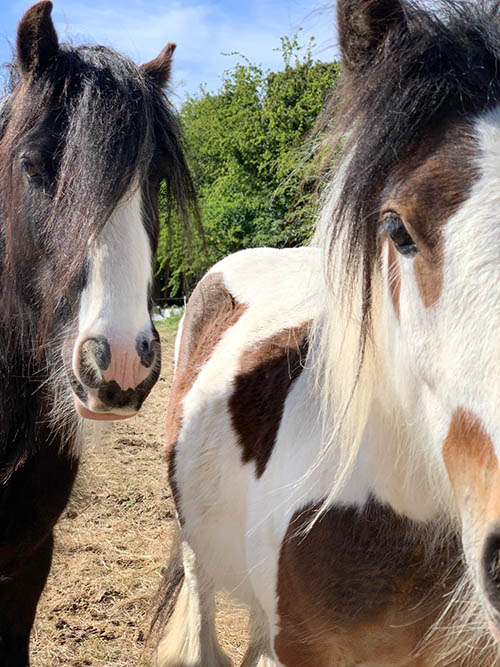
WE ALL HAVE A PART TO PLAY
Of course, equine welfare is not just a problem in Ireland, it’s an issue that needs to be addressed on a global scale and we all play a part.
“Equines are very sensitive and highly intelligent creatures. They provide humans with companionship, livelihoods, transport, entertainment, leisure and sporting activities. Yet within all these industries, right across the world, there is neglect and abuse, some of it beyond horrific,” says Dorothy, explaining people need to consider the expected longevity of their animals after their working life.
“Firstly, equines can live for anything up to 30 years, some beyond and they need a retirement plan, something that quite honestly the vast majority of owners do not take into consideration. Whether an equine is being used as part of your livelihood or as a hobby, owners need to plan for the day when they are no longer able to perform the tasks required of them. If it’s necessary to sell one of your equines, you should ensure they go to a good home.”
All MLHR equines, once adopted, remain under the ownership of MLHR on their passports to protect them for the rest of their lives. “In our adoption contract we do not allow for them to be either bred from or sold on. While we try very hard to place our equines in loving forever homes, we also make sure that if at any stage the adopter does not want to keep them, they can come back to their MLHR family. We love them forever so that means protecting them forever.”
MLHR believes all working equines should have rights, just as humans have rights in our daily jobs. “There should be a limit to how many hours a day they can carry people or goods, a limit to the weight they can be expected to carry, rest breaks and sufficient food, nutrition and night-time shelter provided for them. They are loyal, obedient and work very hard and we should never abuse that.
“Within all the leisure and sporting industries, it is well known that abuse goes on. This should not be tolerated and every equine, no matter how fast they are or how many championships they win, should be loved and cared for in exactly the same way. We can’t all be top of our game and it is the same for animals, so just like us they should not be discarded or killed simply because they are not the best.”
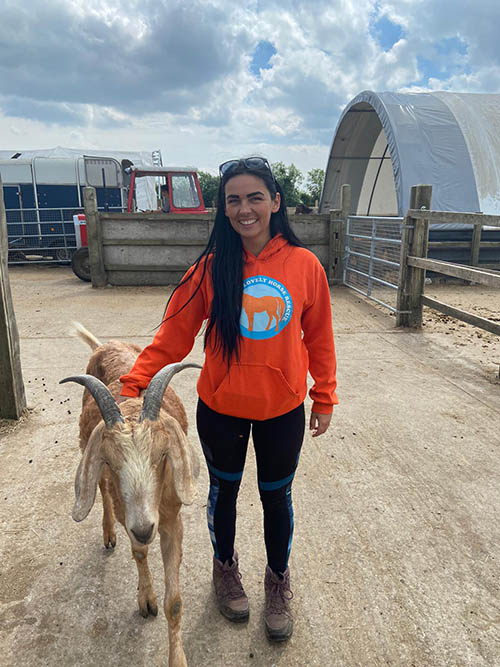
LEGISLATION & ENFORCEMENT
Traceability of equines is a problem worldwide – one that we’re currently coming to terms with here in Australia. “Legislation is key to ensuring complete protection for all equines and for how they are looked after and managed,” continues Dorothy. “Correct passporting and traceability is also essential to protect equines as they pass from owner to owner. It remains a huge problem across Europe and this is felt very much too in our own country. Lack of correct microchipping and passporting leads to the problems of no traceability, horses disappearing off the radar and no welfare or prosecution follow-up possible in serious welfare cases. It leads to an illegal trade in horses and indiscriminate breeding.
“The key is to have strong and robust legislation, easily accessible national databases that are then connected across countries and proper, consistent enforcement of the laws. Without the latter, the rest is only words on paper.
“The issue of equine slaughter, whether for food or due to equines no longer being wanted or needed or because they are considered a nuisance, is one that breaks our hearts. The sight of these magnificent creatures being carted off in trucks and the thought of what awaits them at the end is horrifying. MLHR is very strongly opposed to this; we would urge the public to refuse to eat horse, donkey or mule meat and to ask themselves serious questions about the treatment of equines in their own countries. These noble creatures deserve our protection.”
Whether you work with horses, own horses or are simply a member of the public, we all have our part to play in raising welfare standards. “Awareness is key. Whether you’re stepping into a horse-drawn carriage in Dublin city, getting on the back of a mule to climb Machu Picchu or exploring Egyptian tourist resorts, look at the equine who is about to carry you. If he is not in good body condition, if he looks tired and in need of a break, if he has cuts and sores, if there is anything that would make you think that you should not get on this animal and make him carry you, then don’t. Report him and his owner to the relevant authorities and try to get him help.
“Protecting equines in all of these above areas is of the utmost importance. We at MLHR believe that these remarkably sensitive and clever creatures should be viewed more for what they can give and teach us than for what we can take from them.”
MLHR urges everyone to seek out the equine rescues in your own country and support them, whether by donating, volunteering, fostering or adopting from them. EQ
You can find out more about My Lovely Horse Rescue here.
YOU MIGHT ALSO LIKE TO READ:
The Women Transforming Equine Welfare – Equestrian Life, December 2021

